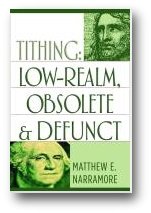Malachi 3:8-12 Will a man rob God? Yet ye have robbed me. But ye say, Wherein have we robbed thee? In tithes and offerings. 9 Ye are cursed with a curse: for ye have robbed me, even this whole nation. 10 Bring ye all the tithes into the storehouse, that there may be meat in mine house, and prove me now herewith, saith the LORD of hosts, if I will not open you the windows of heaven, and pour you out a blessing, that there shall not be room enough to receive it. 11 And I will rebuke the devourer for your sakes, and he shall not destroy the fruits of your ground; neither shall your vine cast her fruit before the time in the field, saith the LORD of hosts. 12 And all nations shall call you blessed: for ye shall be a delightsome land, saith the LORD of hosts.
1 Corinthians 9:13-14 Do ye not know that they which minister about holy things live of the things of the temple? and they which wait at the altar are partakers with the altar? 14 Even so hath the Lord ordained that they which preach the gospel should live of the gospel.
Hebrews 7:1-6 For this Melchisedec, king of Salem, priest of the most high God, who met Abraham returning from the slaughter of the kings, and blessed him; 2 To whom also Abraham gave a tenth part of all; first being by interpretation King of righteousness, and after that also King of Salem, which is, King of peace; 3 Without father, without mother, without descent, having neither beginning of days, nor end of life; but made like unto the Son of God; abideth a priest continually. 4 Now consider how great this man was, unto whom even the patriarch Abraham gave the tenth of the spoils. 5 And verily they that are of the sons of Levi, who receive the office of the priesthood, have a commandment to take tithes of the people according to the law, that is, of their brethren, though they come out of the loins of Abraham: 6 But he whose descent is not counted from them received tithes of Abraham, and blessed him that had the promises.
Hebrews 7:14-17 For it is evident that our Lord sprang out of Juda; of which tribe Moses spake nothing concerning priesthood. 15 And it is yet far more evident: for that after the similitude of Melchisedec there ariseth another priest, 16 Who is made, not after the law of a carnal commandment, but after the power of an endless life. 17 For he testifieth, Thou art a priest for ever after the order of Melchisedec.
After the order or Melchisedec, is Christ a priest for ever. Was Melchisedec tithed too? Yes he was indeed, by faithful Abraham. And the Lord ordained that they which preach the gospel, should live of the gospel. Those that are pastors, and have no time for other jobs, but spend more time in the word, preaching, ministering, counseling, etc. Their income comes from those that they are feeding. Like a farmer who spends his time cultivating his crops to feed to the people, and is paid, so too are those who spend time making a feast for the children of the Lord, are paid for their services, that they may live, and eat, and take care of spiritual needs and church needs.
As the blessing Abraham received came upon him through faith, and not by the law, so too the blessing of Abraham comes upon the Gentiles, who have faith. So too, as Abraham tithed, so too are the children of Abraham to tithe to the priest after the order of Melchisedec.
Galatians 3:29 And if ye be Christ's, then are ye Abraham's seed, and heirs according to the promise.
Tithe to Jesus.



